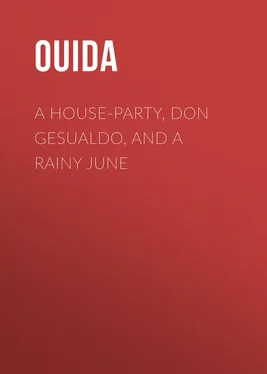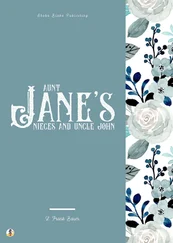Ouida - A House-Party, Don Gesualdo, and A Rainy June
Здесь есть возможность читать онлайн «Ouida - A House-Party, Don Gesualdo, and A Rainy June» — ознакомительный отрывок электронной книги совершенно бесплатно, а после прочтения отрывка купить полную версию. В некоторых случаях можно слушать аудио, скачать через торрент в формате fb2 и присутствует краткое содержание. Жанр: foreign_prose, literature_19, foreign_antique, на английском языке. Описание произведения, (предисловие) а так же отзывы посетителей доступны на портале библиотеки ЛибКат.
- Название:A House-Party, Don Gesualdo, and A Rainy June
- Автор:
- Жанр:
- Год:неизвестен
- ISBN:нет данных
- Рейтинг книги:4 / 5. Голосов: 1
-
Избранное:Добавить в избранное
- Отзывы:
-
Ваша оценка:
- 80
- 1
- 2
- 3
- 4
- 5
A House-Party, Don Gesualdo, and A Rainy June: краткое содержание, описание и аннотация
Предлагаем к чтению аннотацию, описание, краткое содержание или предисловие (зависит от того, что написал сам автор книги «A House-Party, Don Gesualdo, and A Rainy June»). Если вы не нашли необходимую информацию о книге — напишите в комментариях, мы постараемся отыскать её.
A House-Party, Don Gesualdo, and A Rainy June — читать онлайн ознакомительный отрывок
Ниже представлен текст книги, разбитый по страницам. Система сохранения места последней прочитанной страницы, позволяет с удобством читать онлайн бесплатно книгу «A House-Party, Don Gesualdo, and A Rainy June», без необходимости каждый раз заново искать на чём Вы остановились. Поставьте закладку, и сможете в любой момент перейти на страницу, на которой закончили чтение.
Интервал:
Закладка:
The guests are numerous; they might even he said to be miscellaneous, were it not that they all belonged to the same set. There is Dick Wootton, who believes himself destined to play in the last years of the nineteenth century the part played by Charles Greville in the earlier. There is Lord Vanstone, an agreeable, eccentric, unsatisfactory valetudinarian, who ought to have done great things with his life, but has always been too indolent and had too bad health to carry out his friends' very large expectations of him. There is the young Duke of Whitby, good-natured and foolish, with a simple pleasant face and a very shy manner. "If I had that ass's opportunities I'd make the world spin," says Wriothesley Ormond, who is a very poor and very witty member of Parliament, and also, which he values more, the most popular member of the Marlborough. There is Lord Iona, very handsome, very silent, very much sought after and spoilt by women. There is Hugo Mountjoy, a pretty young fellow in the Guards, with a big fortune and vague ideas that he ought to "do something;" he is not sure what. There is Lawrence Hamilton, who, as far as is possible in an age when men are clothed, but do not dress, gives the law to St. James Street in matters of male toilet. There is Sir Adolphus Beaumanoir, an ex-diplomatist, admirably preserved, charmingly loquacious, and an unconscionable flirt, though he is seventy. Each of these happy or unhappy beings has the lady invited to meet him in whom his affections are supposed to be centred, for the time being, in those tacit but potent relations which form so large a portion of men's and women's lives in these days. It is this condonance on the part of his wife which George Usk so entirely denounces, although he would be very much astonished and very much annoyed if she made any kind of objections to inviting Dulcia Waverley. Happily, there is no Act of Parliament to compel any of us to be consistent, or where would anybody be?
Lady Dolgelly, much older than himself, and with a taille de couturière , as all her intimate friends delight to reveal, is supposed to be indispensable to the existence of His Grace of Whitby; Lady Leamington is not less necessary to the happiness of Wriothesley Ormond. Mr. Wootton would be supposed incapable of cutting a single joke or telling a single good story unless his spirits were sustained by the presence of Mrs. Faversham, the prettiest brunette in the universe, for whom Worth is supposed to make marvellous combinations of rose and gold, of amber and violet, of deep orange and black, and of a wondrous yellow like that of the daffodil, which no one dares to wear but herself. Mrs. Wentworth Curzon is the momentary goddess of Lawrence Hamilton; and Lord Iona, as far as he has ever opened his handsome mouth to say anything "serious," has sworn himself the slave of Madame de Caillac. Sir Adolphus has spread the ægis of his semi-paternal affection over the light little head of that extravagant little beauty, Lady Dawlish; whilst Hugo Mountjoy is similarly protected by the prescient wisdom and the rare experience of his kindest of friends, Lady Arthur Audley.
Sir Hugo and several other gilded youths there present are all exact patterns of one another, the typical young Englishman of the last years of this curious century; the masher pure and simple; close-shaven, close-cropped, faultlessly clothed, small of person, small of features, stiff, pale, insignificant, polite, supercilious, indifferent; occasionally amusing, but never by any chance original; much concerned as to health, climate, and their own nerves; often talking of their physicians, and flitting southward before cold weather like swallows, though they have nothing whatever definite the matter with them.
These young men are all convinced that England is on the brink of ruin, and they talk of it in the same tone with which they say that their cigarette is out, or the wind is in the east. The Throne, the Church, the Lords, and the Thirty-Nine Articles are all going down pell-mell next week, and it is very shocking; nevertheless, there is no reason why they should not be studious of their digestions and very anxious about the parting of their hair.
It never occurs to them that they and their father's battue-shooting, pigeon-shooting, absenteeism, clubism, and general preference for every country except their own, may have had something to do with bringing about this impending cataclysm. That all the grand old houses standing empty, or let to strangers, among the rich Herefordshire pastures, the green Warwickshire woods, the red Devon uplands, the wild Westmoreland fells, may have also something to do with it, never occurs to them. That while they are flirting at Aix, wintering at Pau, throwing comfits at Rome, losing on the red at Monaco, touring in California, or yawning in Berlin, the demagogue's agents are whispering to the smock-frocks in the meadows, and pouring the gall of greed and hatred into the amber ale of the village pothouse, never occurs to them. If any one suggests it, they stare: "such a beastly climate, you know; nobody can stand it. Live in the country? Oh, Lord! who could live in the country?"
And then they wonder that Mr. George has replaced Sir Roger de Coverley, and that Joseph Chamberlain's voice is heard instead of Edmund Burke's.
Their host could kick them with a sensation of considerable satisfaction. Their neatness, smallness, and self-complacency irritate him excessively. The bloods of George the Fourth's time at least were men,—so he says.
"You do these poor boys injustice," says Brandolin. "When they get out in a desert, or are left to roast and die under the equator, they put off all their affectations with their starched cambric, and are not altogether unworthy of their great-grandfathers. Britons are still bad ones to beat when the trial comes."
"They must leave their constitutions at their clubs, then, and their nervous system in their hat-boxes," growls Usk. "If you are like those namby-pamby fellows when you are twenty, Boom, I'll put a bullet through your head myself," he says to his heir one morning, when that good-looking and high-spirited boy has come back from Suffolk.
Boom laughs. He is a careless, high-spirited, extravagant lad, and he does not at present lean towards the masher type. Gordon is in his head; that is his idea of a man. The country had one hero in this century, and betrayed him, and honors his betrayer; but the hearts of the boys beat truer than that of the House of Commons and the New Electorate. They remember Gordon, with a noble, headlong, quixotic wish to go and do likewise. That one lonely figure standing out against the yellow light of the desert may perhaps be as a pharos to the youth of his nation, and save them from the shipwreck which is nigh.
"Curious type, the young fellows," says Brandolin, musingly. "I don't think they will keep England what our fathers and grandfathers made it. I don't think they will, even if Chamberlain and Company will let them, which they certainly won't."
"Tell you what it is," says Usk, "it all comes of having second horses hunting, and loaders behind you out shooting."
"You confound cause and effect. The race wouldn't have come to second horses and men to load if it hadn't degenerated. Second horses and men to load indicate in England just what pasties of nightingales' tongues, and garlands of roses, indicated with the Romans,—effeminacy and self-indulgence. The Huns and the Goths were knocking at their doors, and Demos and the Débacle are knocking at ours. History repeats itself, which is lamentable, for its amazing tendency to tell the same tale again and again makes it a bore.
"I should like to know, by the way," he continues, "why English girls get taller and taller, stronger and stronger, and are as the very palm of the desert for vigor and force, whilst the English young man gets smaller and smaller, slighter and slighter, and has the nerves of an old maid and the habits of a valetudinarian. It is uncommonly droll; and, if the disparity goes on increasing, the ladies will not only get the franchise, but they will carry the male voter to the polling-place on their shoulders."
Читать дальшеИнтервал:
Закладка:
Похожие книги на «A House-Party, Don Gesualdo, and A Rainy June»
Представляем Вашему вниманию похожие книги на «A House-Party, Don Gesualdo, and A Rainy June» списком для выбора. Мы отобрали схожую по названию и смыслу литературу в надежде предоставить читателям больше вариантов отыскать новые, интересные, ещё непрочитанные произведения.
Обсуждение, отзывы о книге «A House-Party, Don Gesualdo, and A Rainy June» и просто собственные мнения читателей. Оставьте ваши комментарии, напишите, что Вы думаете о произведении, его смысле или главных героях. Укажите что конкретно понравилось, а что нет, и почему Вы так считаете.












